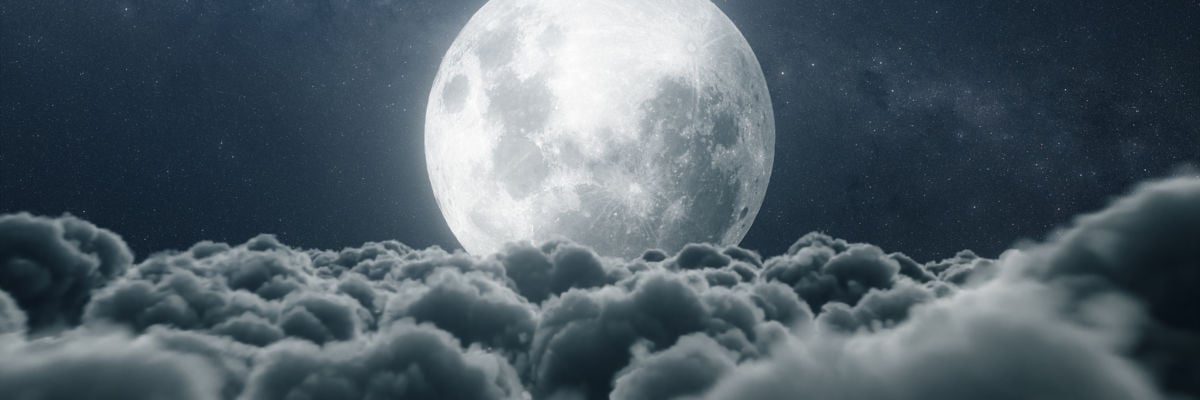
Apologists for Islam usually say the primary miracle that proves the truth of their religion is the unique literary quality of the Quran. But others offer additional miracles allegedly performed by Muhammad, the founder of Islam. An example of one such claim is in a video put out by Muslim apologist Sheik Uthman: that Muhammad split the moon in two and that several witnesses, including non-Muslims, saw it.
First, he points to the Quran as evidence of Muhammad splitting the moon, specifically Sura 54:1-3, which says, “The hour has drawn near, and the moon has split. Yet whenever they see a miracle, they turn away, and say, ‘Continuous magic.’ They lied, and followed their opinions, but everything has its time.” But this doesn’t say Muhammad split the moon, nor does it say who saw this miracle.
Details about Muhammad and other witnesses come from Sahih al-Bukhari, which is a collection of hadiths, or oral traditions about Muhammad. This collection was compiled by Muhammad al-Bukhari around the year 846, or over two hundred years after Muhammad died. Using Sahih al-Bukhari to bolster the moon-splitting miracle would be like saying the evidence we have that Jesus rose from the dead comes from St. Cyprian of Carthage in the year 250, where he claims that Paul, Peter, and the other apostles saw Jesus rise from the dead, and then we know all these facts about Peter, like that he had a mother-in-law, etc.
So I’m skeptical of this testimony, just as I’m skeptical of similar reports even in Catholicism of alleged miracles of the saints that come in stories first recorded hundreds of years later. This isn’t a case of me judging one religion with a different standard from how I judge my own.
We also need to ask: what kind of miracle are we talking about?
Some Islamic scholars say this passage in the Quran refers only to what will happen at the Day of Judgement, or that it’s metaphorical, so it’s not something we’d expect others to record. Or it was just that God caused a group of people to see something that looked like the moon being split in two. I’m more open to that sort of claim, since I believe that God had done things like that before. The description of Joshua commanding the sun to stand still may be a similar optical miracle that only those in that battle saw, or it could be a metaphor, as I note in my book Hard Sayings.
But even if these testimonies were reliably preserved and were sincere, by the time Muhammad died in 632, he was a victorious military leader who had unified the entire Arabian peninsula under Islam. There’s not much to dissuade someone from making grand claims about a person like that. However, the apostles made their claims about Jesus after he died a humiliating death and themselves suffered persecution and utter destruction to affirm that Jesus rose from the dead. Even former enemies of Christianity like St. Paul did the same, so this counts in favor of testimony for the bodily resurrection of Jesus because we wouldn’t expect this kind of testimony unless Jesus really did appear to people after his death.
But it’s not just that we do not have good evidence for Muhammad’s splitting of the moon. We also have evidence against it.
If Jesus rose from the dead and appeared only to Paul and his disciples, then we’d expect the kind of testimony we have today in the New Testament. We wouldn’t expect ancient Roman and Greek historians to say this happened, because the risen Jesus never appeared to them; we’d expect them to say only that Christians believed that this happened. But if Muhammad really did split the moon in two in the seventh century (and Uthman endorses the literal approach to this miracle), we’d expect corroborating physical evidence and corroborating non-Muslim evidence from other cultures at the time.
For example, Uthman shows some NASA pictures of ridges on the moon and talks about how the moon could have actually split, though he doesn’t say this proves that Muhammad split the moon in two. If it did split in half, we’d expect some evidence of this on the moon unless God miraculously repaired the damage. In fact, in 2010, NASA scientist Brad Bailey responded to Muslim questions about these photos, saying, “My recommendation is to not believe everything you read on the internet. Peer-reviewed papers are the only scientifically valid sources of information out there. No current scientific evidence reports that the Moon was split into two (or more) parts and then reassembled at any point in the past.”
Even if God caused this miracle to leave no evidence of a split on the moon’s surface, we’d expect non-Muslim cultures to have recorded this event in either written or oral forms.
If the miracle happened at around 9:00 P.M. Mecca time, then it would still be the early evening, or between 6 and 9 P.M., in Europe, Israel, and North Africa; the late evening, like midnight, in India; and the middle of the night, like 3:00 A.M., in China and Japan. Even in the late hours, there would have been people awake, like the guards in forts or settlements, to have witnessed this. We’d expect it to wind up in folk tales or even be written down in early medieval historians like Venerable Bede in England in 731 or a court historian in the Tang Dynasty in China.
St. John Damascene died in the year 749 and is one of the first fathers of the Church to directly engage Islam and its claims. He never describes anyone, even Muslims themselves, appealing to the miracle of the splitting of the moon as evidence for Islam. Instead, he writes, “When we ask again: ‘How is it that when he enjoined us in this book of yours not to do anything or receive anything without witnesses, you did not ask him: “First do you show us by witnesses that you are a prophet and that you have come from God, and show us just what Scriptures there are that testify about you”’—they are ashamed and remain silent” (The Fount of Knowledge).
Uthman, along with many other Muslims, claims there is an ancient manuscript that describes an Indian king converting to Islam after witnessing this miracle. But Uthman doesn’t tell us how old the manuscript is that he’s describing that references this event. The earliest sources for this alleged event seem to come from Muslim accounts written hundreds of years after the fact.
There are also other historical facts that contradict these claims. For example, popular legends say the oldest mosque in India was constructed by Malik Bin Dinar in 629 after the king’s conversion, but this conflicts with medieval Muslim accounts of no mosques being present during that time, along with the fact that Malik Bin Dinar was born several decades after Muhammad’s death.
In Haseena’s article “Historical Aspects of the Legend of Cheraman Perumal of Kodungallur in Kerala,” he notes that “this fascinating tale of a Kerala king meeting the Prophet Muhammad was first recorded in 1510 CE by the Portuguese writer Duarte Barbosa.” But Barbosa says Muslim traders helped the Indian king convert in the tenth century, not some moon miracle in the seventh century.
The Indian historian A. Sreedhara Menon writes in his book A Survey of Kerala History that Islam may have arrived in Kerala by the seventh century but quotes Muslim travelers, like Sulaiman in 851, who say they know of no one who embraced Islam in the area at that time. Here is his verdict:
On careful consideration of all aspects of the question, it would be seen that the Cheraman legend was only the figment of the imagination of some early writers. It is exceedingly doubtful if any Cheraman emperor became a convert to Islam. . . . The Cheraman legend is thus beyond doubt an anachronism.
In conclusion, we see that there is very little evidence for Muhammad being a miracle-worker or an actual prophet sent by God. More than that, we see a good body of evidence against these claims. The earliest Muslims did not even appeal to these kinds of miracle claims to prove their faith.
In contrast, the origin of the Christian faith in light of Jesus’ apparent defeat on the cross can’t be explained apart from Christ vindicating his identity as a prophet, a miracle-worker, and most importantly the Son of God by rising from the dead. And that is why someone who is considering Islam should see that Muhammad is not a prophet. The time of prophets giving public revelation ended with Jesus Christ, or, as Hebrews 1:1-2 says, “In many and various ways God spoke of old to our fathers by the prophets; but in these last days he has spoken to us by a Son, whom he appointed the heir of all things, through whom also he created the world.”



